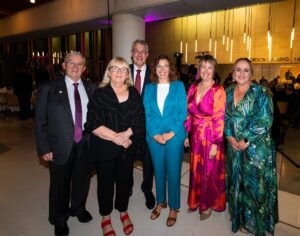
No. 4, 2023 | 4 April 2023
Go to:
From FRSA's Executive Director
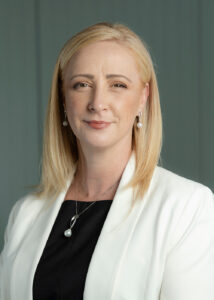
In a few short weeks the Treasurer, the Hon. Jim Chalmers, will deliver the Albanese Government’s 2nd Federal Budget. Whilst their 1st Budget in October 2022 was, as they had widely publicised, focused on their election commitments, the Federal Budget in May this year will begin to show evidence of the priorities they will be setting moving forward.
There are a range of Frameworks and Policy priorities impacting on the Family & Relationship Services sector such as the Closing the Gap Policy agenda, the Safe and Supported Action Plans, the National Plan to end Violence against Women and Children (bit too early to see anything on the Early Years Strategy) and so on, it will be interesting to see how they will be given life in the upcoming Budget.
As reported in previous eBulletins, all programs within scope of the Family and Relationship Services (FRS) sector have now been extended until June 2026 – bringing all those programs into alignment. There was of course the delivery of additional funding to the community sector in the October Budget last year to assist with wage and inflationary pressures – which has provided some welcome relief from an FRS sector specific point of view. The broader issues around appropriate and adequate funding to meet the real costs of service delivery is a bit more of a slow burn body of work that is progressing within the Department of Social Services.
We all know that poverty and homelessness present significant risks to the wellbeing of children, young people, and adults. In the lead up to the Budget there are many reports being released (some of these outlined in this edition) highlighting the impact of increased cost of living pressures and how challenging it is for many people in Australia at the moment. We know too, through our members, that families are doing it tough in many places across Australia. These impacts in the current economic environment cannot be understated and should definitely not be ignored.
That is why we support the Raise the Rate For Good campaign and the removal of the proposed Stage 3 Tax cuts, as outlined in our Pre-Budget Submission.
We are pleased to see the Government moving forward on reforms to the Family Law system intended to make the family law system safer and simpler for separating families to navigate and ensure the best interests of children are placed at the centre. The Family Law Amendment Bill 2023 was introduced to Parliament last week by the Attorney-General and should certainly be acknowledged as progressing change that has been on the backburner for too long. But given the nil cost noted against the Bill’s introduction, some of the practical requirements – such as more availability of Child Inclusive Practice in Family Dispute Resolution – will be something we will continue to pursue.
We are also only about 5 weeks out from the FRSA National Conference and are looking forward to showcasing the work of our sector and other Stakeholders through that program. We are delighted that the Minister for Social Services, the Hon Amanda Rishworth will be joining us in real time – through virtual link – on the Tuesday morning. You can check out our other keynote presenters below.
Registrations are still coming in strongly and will be open until midday on 8 May.
For the first time in a couple of years, school holidays and Easter coincide in the states and territories. I hope you enjoy having some downtime with your families and friends over the coming weeks.
Kind regards,
Jackie Brady
FRSA Executive Director


FRSA is thrilled to welcome Keynote speakers for Day 1 and Day 2 of the FRSA National Conference:
Day 1 – Tuesday, 16 May:
- The Hon Amanda Rishworth MP, Minister for Social Services (Live virtually with Q&A)
- Catherine Liddle, CEO, SNAICC – National Voice for our Children
Day 2 – Wednesday, 17 May:
- Attorney-General, The Hon Mark Dreyfus KC MP (Pre-recorded)
- Micaela Cronin, Commissioner, Domestic, Family and Sexual Violence Commission
The FRSA National Conference 2023 aims to deliver the rich knowledge, insights that only the family and relationship sector can offer insight to as we continue to face uncertainty.
Stay up to date on Conference news by subscribing to our Conference and Forum Updates
Gold Sponsor: Uniting
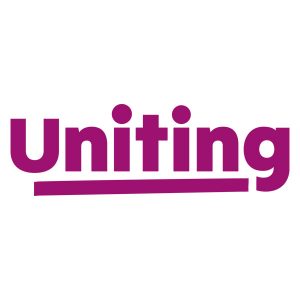 Uniting – Enhancing the safety and wellbeing of children and families
Uniting – Enhancing the safety and wellbeing of children and families
Most people experience challenges in their personal relationships, especially during separation and divorce. Uniting’s specialist family law and family relationship services support people to foster healthy thinking and behaviour while improving the ways they communicate and connect with others.
Uniting counsellors are professionally trained trauma-informed family therapists, with the skills necessary to help people improve relationship habits, manage conflict and share positive communication.
Uniting mediators are accredited by the Attorney-General’s Department and are professionally trained to conduct parenting and property mediation.
Our counselling and mediation services encompass child-inclusive-practice to ensure children’s experiences and voices are heard and relayed by a trained child consultant.
We offer in-person, online and telephone appointments to provide:
- Family law mediation, including parenting plans and property agreements
- Family law counselling
- Individual, couple and family therapy
- Therapy and groups to support children after separation
- Court-ordered counselling and mediation
No matter what personal relationship challenges you may find yourself dealing with, we’re ready and able to help. Uniting values diversity and we always welcome everyone, exactly as they are.
Welcome new sponsors!
FRSA is thrilled to welcome the following organisations on board as sponsors for the National Conference 2023.
- eSafety Commission as a Silver Sponsor
- Anglicare Australia as the Mobile Office Sponsor
- Emerging Minds as an Exhibitor
- OurFamilyWizard as an Exhibitor
We still have sponsorship packages available get in touch with the FRSA team on (02) 6162 1811 or events@frsa.org.au or view our sponsorship prospectus.

10th Anniversary of the National Apology for Forced Adoptions
Tuesday 21 March marked the 10th anniversary of the National Apology for Forced Adoptions.
The National Apology acknowledged the lifelong pain and suffering associated with forced adoption practices and committed to supporting all those affected to get the help they need.
Those affected by these experiences have not been forgotten. The 10th Anniversary was a date of national significance for a large number of people. To mark this important milestone, the Government hosted commemorative activities in Canberra on 21 and 22 March 2023.
The commemoration brought together people directly affected, along with those who tirelessly worked, and continue to work, as supporters of the forced adoptions community.
The program of events to commemorate the 10th Anniversary consisted of:
- A commemorative dinner on 21 March 2023, and
- A statement on significant matters in the House of Representatives on the morning of 22 March 2023.
It also aimed to bring national attention to the truth of the mothers, children and fathers who today still live with the consequences of this trauma.
See images from the commemorative dinner below:
ACCSA Forum 2023
FRSA’s Manager Policy and Research, Robyn Clough, was thrilled to have the opportunity to attend the Australian Children’s Contact Services Association (ACCSA) Training and Networking Forum in Adelaide last week and connect with FRSA members delivering Children’s Contact Services (CCS).
The Forum attracted over 150 delegates from around the country who came together to share their experience and expertise in delivering Children’s Contact Services, learning from each other as well as from the Forum presenters. ACCSA was able to secure a special guest from the United States, Joe Nullet, who convenes ACCSA’s US counterpart – the Supervised Visitation Network. Joe shared his years of experience in the field workshopping the topics of professional boundaries, conflicts of interest and maintenance of neutrality, as well as strategies for safe and effective intervention.
The Attorney-General’s Department provided an update on development of an accreditation system for all CCS – government-funded and private providers. Introducing accreditation to ensure all families accessing CCS are offered a safe and supportive service is something ACCSA has long advocated for. FRSA similarly supports an accreditation system for CCS. The department is slowly but surely working towards introducing accreditation and explained to delegates the steps in government process required to introduce a new regulatory system. It is anticipated that an accreditation system will be up and running by 2026 at the earliest.
The Australian Institute of Family Studies presented on the evaluation of government-funded CCS that they have been commissioned by the Attorney-General’s Department to undertake. This evaluation will feed into the broader review of family law services funded under the Attorney-General’s Department, which the department recently notified providers about.
Congratulations to outgoing ACCSA Convenor, Sue Thompson, and Project Worker, Mike Cross on a hugely successful gathering.
Left Behind: Australia’s regions will lose out from tax cuts
Anglicare Australia has released Left Behind, a paper showing that the planned Stage 3 Tax Cuts will go to highest income earners in the country and leave behind regional, rural, and disadvantaged areas.

The paper shows that most Australians will not get any benefit from the changes. This is because tax relief for low and middle income earners has come to an end just as Australians prepare for the introduction of the Stage 3 Tax Cuts. The changes leave most Australians worse off or with no change at all. It projects that 78 per cent of the tax cuts will go to 20 per cent of Australia’s highest income earners, while those earning less than $45,000 will receive no benefit.
Key findings:
- The tax changes will benefit people living in the wealthiest parts of Australia’s major cities
- Tasmanians will get the least benefit of any State or Territory
- Half of the regions in the bottom ten are in regional NSW
- All regions in the bottom ten are regional or rural areas.
Latest ANROWS research shines light on community attitudes towards violence against women
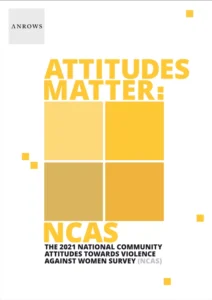 This week Australia’s National Research Organisation for Women’s Safety (ANROWS) released the Attitudes matter: the 2021 National Community Attitudes towards Violence against Women Survey (NCAS), findings for Australia report.
This week Australia’s National Research Organisation for Women’s Safety (ANROWS) released the Attitudes matter: the 2021 National Community Attitudes towards Violence against Women Survey (NCAS), findings for Australia report.
The NCAS is the world’s longest-running population-level survey of community attitudes towards violence against women. The NCAS tells us how people understand violence against women, their attitudes towards it, and if there has been a change over time. It also gauges attitudes to gender equality and people’s preparedness to intervene when witnessing abuse or disrespect towards women.
This report presents findings from the 2021 NCAS and considers these in the context of related research. The findings are drawn from interviews with a representative sample of 19,100 Australians aged 16 years or over.
The NCAS data demonstrates that although some progress is being made on attitudes towards gender equality, too many people still hold attitudes that entrench inequality and discrimination.
Key findings:
- Understanding of the gendered nature of domestic violence lags behind recognition of individual violent behaviours.
- Understanding of the diverse forms of violence against women has slowly improved but there is less recognition of non-physical abuse and coercive control than physical forms of violence.
- Community attitudes towards gender inequality are slowly improving but some attitudes that support gender inequality persist in a sizeable minority of the population.
New report highlights depth of poverty for people on income support
New research from Australian Council of Social Service and UNSW Sydney has found that current income support payments are failing to meet essential costs, causing a high risk of poverty for people receiving income support.
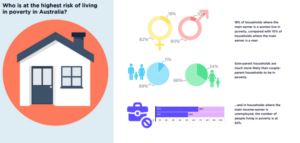
The report, Poverty in Australia 2023: Who is affected, found that people who are unemployed, people receiving income support, renters, sole parents, women, children and people with disability are at highest risk of poverty, while those on Youth Allowance experience deepest poverty.
Households relying on Youth Allowance are in the deepest poverty, with incomes on average $390 per week below the poverty line. People in households relying on JobSeeker are $269 per week below the poverty line, and people in households relying on parenting payment are $246 per week below the poverty line.
By payment type, 60% of people receiving JobSeeker Payment and 72% of people receiving Parenting Payment live in poverty, compared with one in eight (13%) people and one in six children (17%) in poverty overall, based on the latest available data from the Australian Bureau of Statistics.
This highlights the failure of relevant payments and supplements to meet essential costs, including the real costs of raising children as a single parent.
The experience of poverty is also highly gendered. Households whose main income-earners are women experienced almost twice the level of poverty in 2019-20 as those whose main income-earners are men (18% compared with 10%).
Housing status is a major poverty risk, with 1 in 5 people (20%) renting privately and half (52%) of people in public housing living below the poverty line, compared with 10% of mortgage holders and 8% of home-owners without a mortgage.
Sole parent families, migrants from non-English speaking nations and people with a disability are all experiencing poverty at above average levels.

FRSA’s new Reconciliation Action Plan
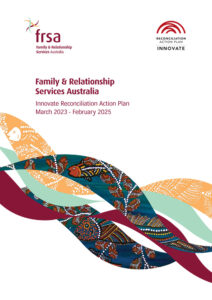 FRSA is delighted to announce that our latest Reconciliation Action Plan March 2023 – February 2025 has been endorsed by Reconciliation Australia.
FRSA is delighted to announce that our latest Reconciliation Action Plan March 2023 – February 2025 has been endorsed by Reconciliation Australia.
This is our third plan to embed reconciliation within our business and our second to be endorsed by Reconciliation Australia as part of the RAP Program.
In discussion with Reconciliation Australia, we decided that it was the right time to extend ourselves and develop an Innovate RAP, switching gears and building on our previous Reflect RAP. Accordingly, we see this plan as marking a departure from a more inwardly focused reflection on reconciliation and what it means for our organization as a small secretariat, to including a stronger outward focus on the role our Member Organisations might play in contributing to Closing the Gap. To this end we look forward to working with FRSA Members over the coming two years – and beyond – as we collectively take part in the Closing the Gap journey.
FRSA acknowledges and thanks the FRSA Board members who sit alongside FRSA Executive Director, Jackie Brady, and Manager Policy and Research, Robyn Clough, on our RAP Working Group: Glenda Devlin, Teresa Jayet and RAP Working Group Chair, his Honour Judge Matthew Myers AM.
FRSA RAP is available on our website.

Family Law Amendment Bill introduced to Parliament
The Family Law Amendment Bill 2023 was introduced to Parliament on 29 March 2023.
The legislation aims to foreground the best interests of children and make the Family Law Act simpler and safer for separating families.
The Attorney-General’s Department undertook a public consultation on the draft legislation earlier this year. Submissions to that consultation, including FRSA’s submission, are available on the department’s website.
The Bill may be referred to a parliamentary committee for inquiry.
Public consultations
Early Years Strategy
The Australian Government is developing an Early Years Strategy to shape its vision for the future of Australia’s children and their families.
The Strategy will help the Commonwealth create a more integrated, holistic approach to the early years and better support the education, wellbeing and development of Australia’s children. It will seek to support improving coordination between Commonwealth programs, funding and frameworks impacting early childhood development.
Public submissions are now open and a Discussion Paper has been released. Submissions close on 30 April 2023.
Cost of living
The submission closing date for the Cost of Living inquiry has been extended to 12 May 2023.
The Select Committee on the Cost of Living, has been asked to inquire into and report on:
- the cost of living pressures facing Australians
- the Government’s fiscal policy response to the cost of living
- ways to ease cost of living pressures through the tax and transfer system
- measures to ease the cost of living through the provision of Government services
- any other related matter.
For more information visit the Committee’s webpage.
Family Law Amendment (information Sharing) Bill introduced
The Family Law Amendment (Information Sharing) Bill 2023 was also introduced to Parliament on 29 March 2023.
The Bill aims to make Australia’s family law system safer by improving information sharing from state and territory family violence and child protection systems during family law proceedings.
This Bill, which complements the Family Law Amendment Bill 2023, will contribute to a family law system that is safer and places the best interests of children at the centre of the system.
The information sharing arrangements will be reviewed 12 months after their commencement, to ensure they are working as intended.
Social Services Legislation Amendment (Child Support Measures) Bill 2023
The Social Services Legislation Amendment (Child Support Measures) Bill 2023, which was introduced to Parliament on 29 March, aims to improve the timely collection of child support owing to parents and help prevent future debt among low-income parents.
The Bill includes three changes – extending employer withholding, tightening arrangements around departure prohibition orders and improving income accuracy for low-income parents.
Minister for Social Services, the Hon Amanda Rishworth, has described these changes as the start of the Albanese Government’s reform of child support to make the scheme better for parents and children.
Government response to inquiry into family, domestic and sexual violence
The Albanese Labor Government has tabled its response to the House of Representatives Standing Committee on Social Policy and Legal Affairs Inquiry into family, domestic and sexual violence.
The Inquiry was established in June 2020 and the Committee was asked to inquire into and report on family, domestic and sexual violence, including with a view to informing the next National Plan to Reduce Violence against Women and their Children. The Committee published its report on 1 April 2021.
The Committee made a total of 88 recommendations. The Government supports 34, supports in-principle 37, partially supports one, notes 14 and does not support two.
The Government’s response to the Committee’s report can be found here. Information on the inquiry, including FRSA’s submission and transcript of evidence is available on the Committee’s website.

Join Relationships Australia Victoria’s New Internship Network
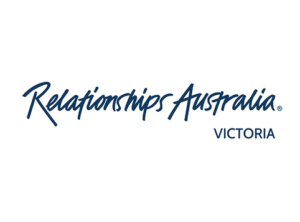 Relationships Australia Victoria is inviting private practitioners and organisations to join a new Internship Network that is designed to extend its provider framework for the Specialist Course in Integrative Couple Therapy. Now in its 33rd year, this course provides students with specialist training in couple therapy, including through internships of 100-180 hours.
Relationships Australia Victoria is inviting private practitioners and organisations to join a new Internship Network that is designed to extend its provider framework for the Specialist Course in Integrative Couple Therapy. Now in its 33rd year, this course provides students with specialist training in couple therapy, including through internships of 100-180 hours.
Support the development of the next intake of couple therapists and enjoy the benefits of being part of this national network. Find out more
Remembering and recovering from COVID-19 research report
 Relationships Australia has released a new research report ‘Remembering and recovering from COVID-19’. Partnering with Merri-bek City Council and Lendlease Victoria to conduct the qualitative project, the research involved surveys and focus groups with multicultural communities across Melbourne.
Relationships Australia has released a new research report ‘Remembering and recovering from COVID-19’. Partnering with Merri-bek City Council and Lendlease Victoria to conduct the qualitative project, the research involved surveys and focus groups with multicultural communities across Melbourne.
Findings demonstrate that high rates of multicultural frontline workers, reduced access to education and employment, geographic separation from family and mental health taboos all led to elevated experiences with grief, trauma and distress. However, social activities provided a promising option for community-led recovery, highlighting the importance of social connection for multicultural communities in the wake of the pandemic.
Harmony Week
Harmony Week was on from 20 – 26 March. The week is a celebration that recognises our diversity and brings together Australians from all different backgrounds. It’s about inclusiveness, respect and a sense of belonging for everyone.
See how FRSA Member celebrated the week below:
- Anglicare SA staff, residents, and customers across their sites celebrated the cultural diversity and inclusivity of our community. From orange clothes and cupcakes at their Residential Aged Care sites to creating an organisation-wide heritage map.
- Kyabra Community Association Inc staff wore orange to celebrate the week.
- City of Greater Geelong shared a video message from Mayor Trent Sullivan.
- Anglicare Southern Queensland’s Brisbane staff clients enjoyed a special service and celebration, including a live cultural performances and multicultural cuisine. While their Children and Families team on the Gold Coast also joined Harmony Week celebrations at the Broadwater Parklands. And their Abri Residential Aged Care home celebrated Harmony Day by sharing food and stories about their culture. Staff brought in a plate of food that represented their culture.
- Anglicare Sydney shared a video interviewing an ESL student on their experience in their classes.
- Relationships Australia WA’s Perth Family Relationship Centre team shared a Harmony Day Lunch together.
- Centacare South West NSW’s staff celebrated the week by wearing orange and enjoying a meal together.
- EACH sat down with Bicultural Worker, Kham Lian to learn about how Bicultural Workers foster belonging for Culturally and Linguistically Diverse (CALD) communities.
- CatholicCare staff celebrated with a Harmony Day morning tea.
- Uniting Communities took part in a Harmony Day event at Northern Sound System in Elizabeth.
- CatholicCare Sydney held a Harmony Day lunch with their Disability Services team in Lakemba.
- FamilyCare staff celebrated Harmony Day with a lunch and cultural feast.
- CatholicCare Hunter-Manning celebrated Harmony Day at their CatholicCare Refugee Hub with staff, volunteers and clients. People connected over food from their different cultures, with everyone bringing a plate to share. Read more.
- MacKillop Family Services spoke with foster carer Berny and reflected on the role that foster carers play to support young people to belong, and connect to their culture.
- PRONIA shared a video speaking to their Manager Family and Community Services, Mary Sophou about diversity and harmony and a workspace where everyone truly belongs.
- Centrecare Inc held events with staff all around Western Australia including in Perth, Cannington, Mirrabooka, Kalgoorlie, Gosnells and Midland.
- Luthern Care teams were encouraged to participate in various events to celebrate the rich mix of cultures and experiences they bring to the table. They shared how their Northern Territory team and Family Zone’s Conversational English group celebrated. And highlighted the diverse cultures within their workforce, clients and community.
Centacare Catholic Family Services expands southern footprint
 Centacare Catholic Family Services Adelaide’s metropolitan footprint has expanded their southern footprint with the opening of a new site at Colonnades Shopping Centre.
Centacare Catholic Family Services Adelaide’s metropolitan footprint has expanded their southern footprint with the opening of a new site at Colonnades Shopping Centre.
Home to Breathing Space and RESTORE Intensive Family Services – South, the space aims to strengthen connections with families and the services they work with to support them.
“The clients live in this community, so to be present in community, with the families and young women we walk alongside and support is significant,” said Amalie Mannik, Executive Manager of Children’s Services.
“Cutting down travel time to go to clients’ homes has meant we are able to reinvest that time back into families, which is where it should be.”
Centacare is the state’s largest provider of early intervention intensive family services which are also delivered in the north and Mount Gambier.
Collectively, RESTORE and Breathing Space supported 933 clients in 2021-2022, including 556 children. Read more

Call for participants: Children’s Voices for Change project
 The Children’s Voices for Change project, funded by Family Safety Victoria, is seeking practitioners in Victoria who provide services to children aged 0-13 years who have experienced family violence, to complete a short anonymous online survey. Please click here to learn more and to access the survey. Responses will close on Monday, 24 April 2023.
The Children’s Voices for Change project, funded by Family Safety Victoria, is seeking practitioners in Victoria who provide services to children aged 0-13 years who have experienced family violence, to complete a short anonymous online survey. Please click here to learn more and to access the survey. Responses will close on Monday, 24 April 2023.
To provide additional context to the call for participants, this survey forms part of the ‘Children’s Voices for Change’ research project, which has been funded by Family Safety Victoria’s Family Violence Research Grants Program (Phase 1). It is led by Southern Cross University, in partnership with Swinburne University of Technology, Safe and Equal and the Centre for Excellence in Child & Family Welfare.
The project seeks to understand what constitutes effective supports for children aged 0-13 years as victim-survivors of family violence in their own right. It seeks to build a practice-informed evidence base about how to meaningfully and safely engage children’s voices and experiences to inform service design and delivery, as well as outcomes monitoring and measurement.
The survey should take less than 15 minutes to complete. It asks about the nature and location of the services that practitioners provide, the frequency of interaction with children and young people who have experienced family violence, and reflections on supportive factors, barriers, and areas for improvement.
The data from this survey will be used to co-design a Children’s Feedback Tool, for implementation by services in Victoria that support children who have experienced family violence. The tool will enable these services to centre children’s experiences and work with this group in a child-centred, trauma-informed way that promotes and upholds their rights.
Survey on Gender Equality
 On 8 March, Minister for Women, Senator the Hon Katy Gallagher, launched a survey and discussion paper to inform the development of the National Strategy to Achieve Gender Equality.
On 8 March, Minister for Women, Senator the Hon Katy Gallagher, launched a survey and discussion paper to inform the development of the National Strategy to Achieve Gender Equality.
This consultation allows people to answer questions about what matters to them in their own voice. Organisations will also have the chance to participate as part of the consultation, guided by a discussion paper to spark conversations in homes, workplaces, schools, communities and among friends on gender equality.
Click here to complete the survey, consultations are open until 19 April 2023. Find out more at the National Strategy to Achieve Gender Equality website.
National Families Week - Event Registrations open
 Families Australia invites you to host a National Families Week event at home, in your organisation, in your networks and community. National Families Week is on 15-21 May 2023. The aim of National Families Week is to celebrate the vital role that families play in Australian society.
Families Australia invites you to host a National Families Week event at home, in your organisation, in your networks and community. National Families Week is on 15-21 May 2023. The aim of National Families Week is to celebrate the vital role that families play in Australian society.
The theme for 2023 living real, dreaming big celebrates the importance of individual, family and community systems in influencing and supporting family wellbeing, safety and resilience.
Living real promotes some of the practical, supportive strategies and resources available, to foster resilience in individuals, in families and within communities.
Dreaming big is a celebration of our successes, and firmly places resilience as a central building block of individual and community wellbeing.
Register your event or download resources from the National Families Week website.
Effective Online Group Leadership Workshop
SUNSHINE CIRCLES – Albury
SUNSHINE CIRCLES – Shepparton
HEY LITTLE WARRIOR – Sale
ACT
Government Relations and Policy Officer | Catholic Social Services Australia
VIC
Family Relationship Counsellor | Relationship Matters
Family Preservation & Reunification Early Years Practitioner/Case Manager | Odyssey House Victoria
Child and Family Social Worker | Odyssey House Victoria
First Nations Engagement Specialists | Relationships Australia Victoria
Senior Family Dispute Resolutions Practitioner | OzChild
Family Dispute Resolution Practitioner (FDRP) & FDR Intake Practitioner | Upper Murray Family Care
If you have any events you’d like listed on the FRSA Events and Training Calendar or job vacancies you’d like listed on the FRSA Jobs Board, email Communications Officer, Vanessa Lam at communications@frsa.org.au. Please note that posting onto the FRSA website is reserved for FRSA Members only.

Gambling participation, experience of harm and community views | Australian Institute of Family Studies
This study has provided important insights into gambling participation, expenditure and harm among Australian adults. It has also captured community views on wagering advertising and how it should be regulated.
How to implement online warnings to prevent the use of child sexual abuse material | Australian Institute of Criminology
 Online child sexual abuse material (CSAM) offending is a challenge for law enforcement, policy-makers and child welfare organisations alike. To address this, the authors of this report use a case study to analyse the actions individuals and organisations within the technology, government, non-government and private sectors could take to implement warning messages.
Online child sexual abuse material (CSAM) offending is a challenge for law enforcement, policy-makers and child welfare organisations alike. To address this, the authors of this report use a case study to analyse the actions individuals and organisations within the technology, government, non-government and private sectors could take to implement warning messages.
Financial abuse: the weaponisation of child support in Australia | Swinburne University of Technology
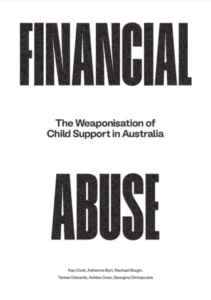 This report draws on post-separation lived experience to demonstrate the ways that the Australian Child Support Scheme can be used and abused to jeopardise the financial safety of recipient parents and their children. This abuse primarily affects women, who continue to carry the burden of unpaid care work in Australia (and internationally) and are overrepresented as victim-survivors of family violence. In this report, the authors explore the ways that the Child Support Scheme can be used to financially abuse women, and the devastating impacts of this abuse on mothers’ and children’s lives.
This report draws on post-separation lived experience to demonstrate the ways that the Australian Child Support Scheme can be used and abused to jeopardise the financial safety of recipient parents and their children. This abuse primarily affects women, who continue to carry the burden of unpaid care work in Australia (and internationally) and are overrepresented as victim-survivors of family violence. In this report, the authors explore the ways that the Child Support Scheme can be used to financially abuse women, and the devastating impacts of this abuse on mothers’ and children’s lives.
Better the devil you know than the system you don’t understand: Creating better outcomes for newly arrived young people experiencing family violence | Centre for Multicultural Youth
 This paper discusses insights gained from consultations with multicultural young women and service providers working with newly arrived young people and families, highlighting how family violence is understood, what types of violence are prevalent, and the challenges faced when seeking help.
This paper discusses insights gained from consultations with multicultural young women and service providers working with newly arrived young people and families, highlighting how family violence is understood, what types of violence are prevalent, and the challenges faced when seeking help.
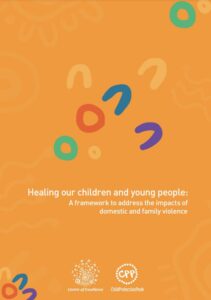 This resource, published by Australia’s National Research Organisation for Women’s Safety, is an evidence-based framework for policy makers and practitioners working with Aboriginal and Torres Strait Islander children who have experienced domestic and family violence. It is designed to meet local needs and recognise the strength of Aboriginal and Torres Strait Islander families.
This resource, published by Australia’s National Research Organisation for Women’s Safety, is an evidence-based framework for policy makers and practitioners working with Aboriginal and Torres Strait Islander children who have experienced domestic and family violence. It is designed to meet local needs and recognise the strength of Aboriginal and Torres Strait Islander families.
Victim-survivors’ views on and expectations for the criminalisation of coercive control in Australia: findings from a national survey | Monash Gender and Family Violence Prevention Centre
 This report presents the findings from a national survey of 1261 victim-survivors of coercive control. The survey examined victim-survivors’ views on the criminalisation of coercive control.
This report presents the findings from a national survey of 1261 victim-survivors of coercive control. The survey examined victim-survivors’ views on the criminalisation of coercive control.
A hidden pandemic? An umbrella review of global evidence on mental health in the time of COVID-19 | Frontiers in Psychiatry
This journal article is a systematic review of the mental health impacts of the COVID-19 pandemic. It contains meta-analyses of global literature comparing pre-COVID-19 to during COVID-19 prevalence of probable depression and probable anxiety. Findings show that probable depression and anxiety were significantly higher than pre-COVID-19, and provide some evidence that that adolescents, pregnant and postpartum people, and those hospitalised with COVID-19 experienced heightened adverse mental health. Policy-makers can modify future pandemic responses accordingly to mitigate the impact of such measures on public mental health.
Youth justice in Australia 2021-22 | Australian Institute of Health and Welfare
This report looks at young people who were under youth justice supervision in Australia during 2021–22 because of their involvement or alleged involvement in crime. It explores the key aspects of supervision, both in the community and in detention, as well as recent trends.
“It’s hell”: how inadequate income support is causing harm | Australian Council of Social Service
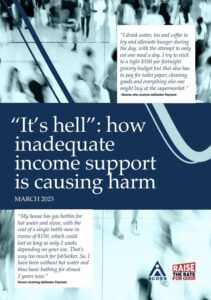 The surging cost of living is having a devastating impact for people on income support, according to this report by ACOSS. Researchers surveyed 365 people living on JobSeeker, Youth Allowance and Parenting Payment over February and March 2023, finding income support payments are completely inadequate.
The surging cost of living is having a devastating impact for people on income support, according to this report by ACOSS. Researchers surveyed 365 people living on JobSeeker, Youth Allowance and Parenting Payment over February and March 2023, finding income support payments are completely inadequate.
Culture and Kinship: evaluation report | Victorian Aboriginal Community Controlled Health Organisation
This evaluation report demonstrates that by focusing on the cultural determinants of health, there are constructive approaches that can be taken to close the gaps in health and wellbeing disadvantage.
Safe and Secure: A Trauma Informed Practice Guide for understanding and responding to children and young people affected by family violence | Australian Childhood Foundation
 Developed by the Australian Childhood Foundation in partnership with the RFVP. The Safe and Secure Practice Guide is a trauma informed practice guide for understanding and responding to children and young people affected by family violence. It can be used by individuals, teams or whole workplaces. The guide talks about the impact of family violence on children and young people, and ways that adults can support healing and growth by meeting the needs of affected children.
Developed by the Australian Childhood Foundation in partnership with the RFVP. The Safe and Secure Practice Guide is a trauma informed practice guide for understanding and responding to children and young people affected by family violence. It can be used by individuals, teams or whole workplaces. The guide talks about the impact of family violence on children and young people, and ways that adults can support healing and growth by meeting the needs of affected children.
Cool, beautiful, strange and scary: the online experiences of Aboriginal and Torres Strait Islander children and their parents and caregivers | Office of the eSafety Commissioner
 This research report explores the online experiences of Aboriginal and Torres Strait Islander children and considers the digital parenting practices of their parents and caregivers.
This research report explores the online experiences of Aboriginal and Torres Strait Islander children and considers the digital parenting practices of their parents and caregivers.
Want to submit something to the FRSA eBulletin?
If you have an news item or event that you would like to be featured in a future eBulletin please submit your announcement via the form below or email communications@frsa.org.au with the subject “FRSA eBulletin submission”.
Please note FRSA members receive priority for items posted in the eBulletin. And to keep information current, relevant and useful, submissions will not be repeated from week to week.
Subscribe
Subscribe to receive future eBulletin editions directly to your inbox!









